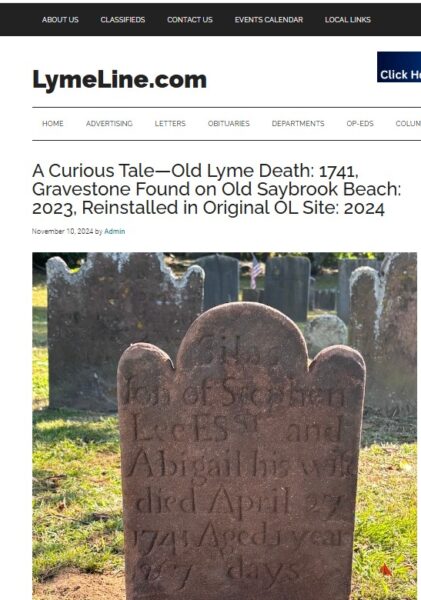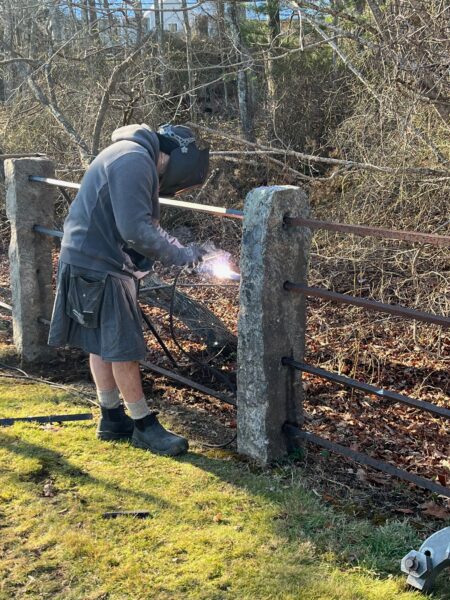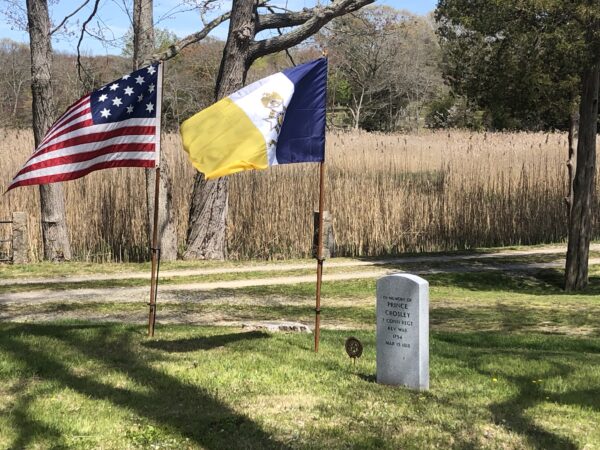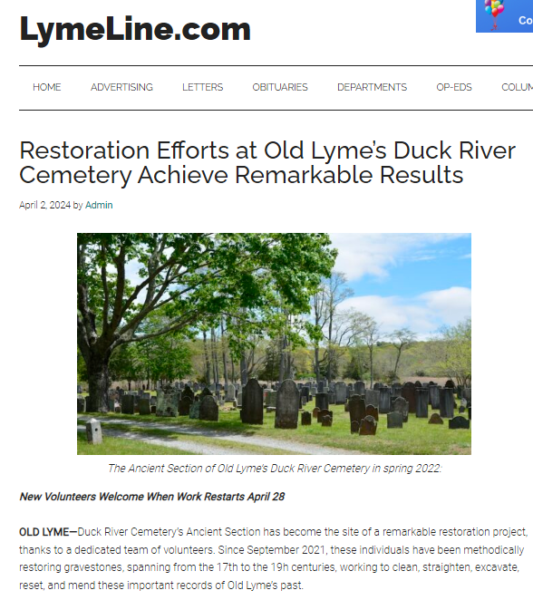OLCA NEWS
Prince Griswold Crosley Honored by the Sons of the American Revolution
The Connecticut Society of the Sons of the American Revolution held a color guard ceremony at Duck River Cemetery on Saturday, May 2, 2024, to honor the African American Patriot Prince Crosley. Some fifty people gathered near a recently installed veteran’s memorial headstone in the cemetery’s Ancient section. The memorial headstone honoring Prince Crosley’s military service stands behind gravestones marking the burial places of his sister Margaret “Peggy” Crosley Lewia, his brother-in-law Lewis Lewia, his niece Eunice Lewia, and his great nephew John Henry Lewia. Gravestones commemorating Gov. Matthew Griswold and his wife Ursula Wolcott Griswold, into whose household Prince, Peggy, and their siblings were born into hereditary slavery, stand not far away.
The ceremony began with words of welcome from Michael Bird, 1st Vice President, CTSSAR. Old Lyme Cemetery Association Vice President Ed Pinn then read a message of welcome on behalf of Carolyn Wakeman, OLCA President, noting that Duck River Cemetery’s Ancient section, where burials began in 1676, includes veterans’ markers for 79 men from Lyme who served in the American Revolution. Crosley, known then as “Gov. Griswold’s slave,” is the first of five formerly enslaved African American veterans from Lyme to be commemorated at Duck River. Crosley’s descendant Keith Edward Wilson and Griswold’s descendant Matthew Griswold 10th also offered remarks.
Prince Crosley returned to Lyme after the war, married Caroline Miller, and raised a large family. Twenty years after he died in 1818, his widow filed for a veteran’s pension. Depositions given in 1838 by family members and others who knew Prince in Lyme preserve details about his life. He was said to carry a fiddle in his pack and to walk with a limp from a wound received during his wartime service. His burial place is not known.
In emotional comments, Matthew Griswold X, age 87, expressed remorse and regret for his predecessors’ slave ownership. “I would like to take this occasion to apologize, to apologize profusely, for the ownership of slaves by my early ancestors,” he said. On behalf of Griswold family members who followed, he stated: “Today we cannot undo the past, but we at least can say that we deeply regret the actions of our early ancestors.” Griswold closed by addressing Prince directly: “Prince, if there is a heaven, I am sure that you and all the other Old Lyme slaves are there, and I hope you can accept how sorry we are.” Applause followed Griswold’s apology.
The ceremony continued with a dedication of the SAR grave marker, a musket salute with three volleys fired across the wetlands, taps played by Michael Bird, and a benediction by CTSSAR chaplain Todd Gerlander.
In attendance were 15 of Crosley’s descendants from Connecticut, Vermont, and Georgia, whose names are listed below. Old Lyme’s former First Selectman Tim Griswold and former VFW Post Commander David Griswold were among those who attended the ceremony. First Selectwoman Martha Shoemaker also joined, together with OLCA members John Noyes and Debbie Froggatt, and Witness Stones Old Lyme committee member Mary Guitar.
Witness Stones, small brass plaques honoring those who lived enslaved in our community, have been placed at the Black Hall triangle on Old Shore Road, near today’s Griswold Point, and on the lawn of the First Congregational Church of Old Lyme to commemorate Prince Griswold Crosley, Margaret Crosley Lewia, and Lewis Lewia. Ten new Witness Stones honoring persons enslaved in historic North Lyme will be installed at the Lyme Public Library later this month.
All are welcome to attend the 2024 Witness Stones installation ceremony on the lawn of the Phoebe Griffin Noyes Library, 2 Library Lane, Old Lyme, on Friday, May 31 at 10:00. The program features reflections by Witness Stones Old Lyme poet Rhonda Ward, who served as New London’s first poet laureate, together with words from community leaders, music, and tributes in verse by Lyme-Old Lyme School’s eighth-grade students. Light refreshments follow the ceremony.
Descendants of Prince Crosley who attended the Duck River color guard ceremony include Kathryn Anderson, Lynn Schwab Boyan, Sandra Wilkinson Lamb, Christopher Mordarski, Bonnie Pitkin-Goodrich, April Michaud, Donna Ripley, Tiffany Ulrich, Linda Ann Walker, Craig P. Wilson, Hunter M. Wilson, Jeremy M. Wilson, Keith Edward Wilson, Mark S. Wilson, Ryan M. Wilson, Catherine “Casey” Wilkinson Zahn, and Vicki S. Welch, Author & Honorary cousin.
The S.A.R. Color Guard included Mike Bird, Todd Gerlander, Jerry Hazeldine, Dave Packard, Dave Perkins, and Stephen Taylor.




